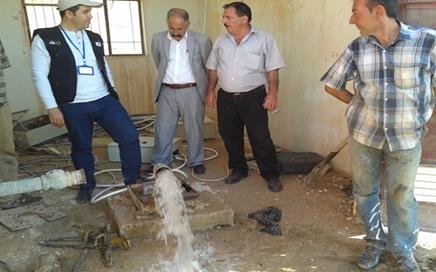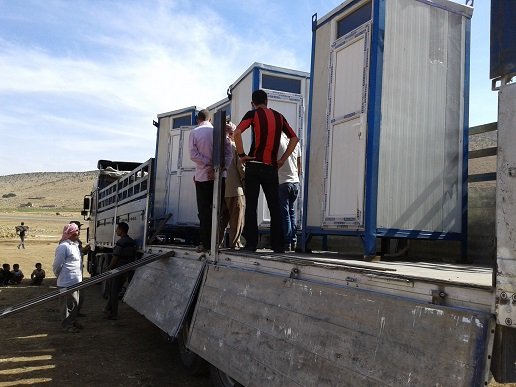By Miyako Hamasaka | PR Manager
In August 2015, JEN conducted well rehabilitation in newly liberated area in Iraqi Kurdistan. As natural water source in many parts of the Northern area is limited, the residents depend on the deep wells to provide water that they need for everyday use. However, many of the wells have been damaged, making it more difficult for Internally Displaced Persons (IDPs) to return to their villages.
As a result, in September there were around 35 wells in the villages that JEN considered as ‘rehabilitation possible’. However, out of only 11 wells were functional. These wells are connected to a main water reservoir for the village, which can be 20 to 30 meters high. When there are not enough functional wells, they cannot produce enough water pressure to fill the reservoirs. Furthermore, if the reservoirs are not be filled, water will not be delivered through the water network. In out of the six villages that JEN considered, we decided to work on two wells that provide water to a village that has around 500 returnees.
The reason, the wells are not working, is from a well to another. Some wells have a burnt motor from overuse, some have damaged pumps, and others just have damaged cables or switch boxes to turn the well on. Therefore, JEN visited the wells with a group of electricians and technicians to assess the damage at first, and then to repair the wells with necessary equipment. This time, all parts including: the motor; the pump; the cables, and the switchbox were replaced for the first well. It is also just that the pump was replaced for the other well. As a result, the wells are now functional and are able to provide water into the village’s water reservoir and to the village itself.
JEN is planning to continue the well rehabilitation work, in coordination with the other area and its governorate water department to prepare necessary water infrastructure for when people begin to return to their villages.
Latrine Installation
The otherJEN’s ongoing challenge in Iraq was Latrine Installation in a mountain area in the need of better sanitation since the winter, which is expected high precipitation, is approaching. This situation is especially grave for facilities to set up for vulnerable people, such as the three health posts and the child friendly space in the mountain, as those of the people, seeking medical attention, are more susceptible to diseases that can be spread through improper sanitation. As cholera has been reported in various parts of Iraq, proper sanitation is one of the priority issues.
One of the major challenges for close 1000 families of the IDPs living in the area is to access to the proper Water and Sanitation Hygiene (WASH) facilities that are culturally appropriate. As their lives in the mountain are temporary, their WASH facilities also tend to be temporary with their latrines consisting of a hole in the ground over a shallowly dug-up septic hole, surrounded by four sides by cloth for privacy. Such latrine can pose serious health risks as the septic tanks can easily overflow and spread to the living areas.
Therefore, JEN decided to install pre-constructed latrines and shower stalls in those four facilities, which included the digging of larger septic tanks with more capacity. The work included a close coordination with the department and another organization that are in charge of the health posts and the child-friendly space, as well as volunteer workers in the mountain who dug the septic tanks.
With the new latrines, up to 120 patients and 250 children per day can have an access to proper and well protected latrines during their visits to those facilities.
By Miyako Hamasaka | PR Manager
By Miyako Hamasaka | PR Manager
Project reports on GlobalGiving are posted directly to globalgiving.org by Project Leaders as they are completed, generally every 3-4 months. To protect the integrity of these documents, GlobalGiving does not alter them; therefore you may find some language or formatting issues.
If you donate to this project or have donated to this project, you can recieve an email when this project posts a report. You can also subscribe for reports without donating.

